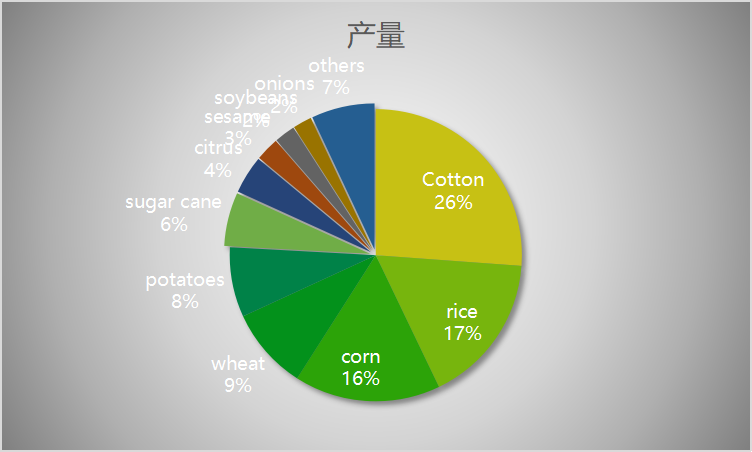 The top ten crops in Pakistan and their proportions are as follows:
The top ten crops in Pakistan and their proportions are as follows:
1. Cotton: 9,391,000 tons, accounting for 26% of the total output
2. Rice: 6,000,000 tons, accounting for 17% of the total output
3. Corn: 5,803,000 tons, accounting for 16% of the total output
4. Wheat: 3,263,000 tons, accounting for 9% of the total output
5. Potatoes: 2,774,000 tons, accounting for 8% of the total output
6. Sugarcane: 2,129,000 tons, accounting for 6% of the total output
7. Citrus fruits: 1,514,000 tons, accounting for 4% of the total output
8. Sesame: 934,000 tons, accounting for 2.6% of the total output
9. Soybeans: 826,000 tons, accounting for 2.3% of the total output
10. Onion: 748,000 tons, accounting for 2.1% of the total output
According to the data, Pakistan ranks 8th in sesame production, with a production of 934,000 tons, accounting for 2.6% of the total production. From 2016 to 2020, Pakistan's sesame production once declined, but it has risen in 2020. By 2023, sesame production reached a record high, and the planting area in 2024 also reached a record high.
After the sesame is harvested and cleaned, it is shipped to China via the Port of Karachi.
Sesame cultivation in Pakistan has an important impact on the local economy. Sesame cultivation and processing is a basic and common agricultural activity that provides employment and income opportunities for local farmers. In addition, sesame cultivation can improve soil quality, increase the diversity of food supply and the quality of agricultural products. In recent years, Beibu Machinery has been strengthening cooperation with Pakistan in related fields to help its sesame planting and harvesting, ensure the income of local farmers and provide high-quality sesame!